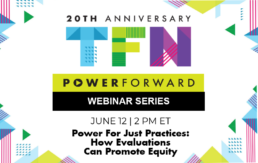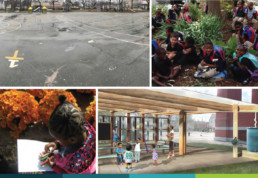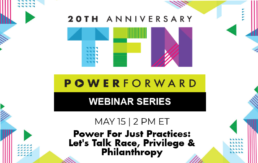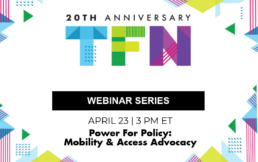Reflections from Smart Growth California's Founding Co-chair
By Mark Valentine
Smart Growth California is a TFN initiative that includes funders working together to build healthy, equitable, and sustainable communities throughout the state, with particular attention to our communities with the greatest need. This post from outgoing Smart Growth California Co-chair Mark Valentine originally appeared on the Smart Growth California blog.

Kaying Hang of the Sierra Health Foundation and
Craig Martinez of The California Endowment .
In March 2019, I had the pleasure of attending the annual conference of The Funders’ Network for Smart Growth and Livable Communities (TFN) in Miami. The conference was a birthday celebration for the organization as well as a homecoming, of sorts — the meeting at which TFN had been founded had been held in Miami twenty years earlier. Thus, in addition to the usual stellar program, there were a number of special events incorporated into the conference to mark the fact that TFN was turning 20.
I attended that inaugural meeting in 1999 in my capacity as a Program Director at the Packard Foundation, and I was among a handful of funders to provide a start-up grant. Twenty years later it was fun to be around colleagues who also were there at the organization’s inception. It also was gratifying to see how that modest investment in TFN has paid impressive dividends over time in terms of the sheer growth of the organization and the impact it has had in shaping the field of integrated, place-based philanthropy.
While in Miami I realized that over the 20 years of TFN’s existence, there’s rarely been a year when I haven’t been in the organization’s orbit as a board member, a consultant, or as a funder. For the past 10 years, I’ve had the honor and pleasure to serve as a founding co-chair of the Steering Committee of Smart Growth California (SGC). I was first paired in that role with Emily Young, formerly of the San Diego Foundation. When she moved on to take the role of Executive Director of the Nonprofit Institute at the School of Leadership and Education Sciences at the University of San Diego, Craig Martinez of The California Endowment graciously agreed to step up to join me as co-chair. After having served ten years in this role, I think it’s time to pass the proverbial torch to my talented colleague, Kaying Hang of the Sierra Health Foundation. She will now assume the role of Co-chair and join Craig in providing support and guidance to SGC’s talented team of Ron Milam, Kerry Hastings and Tim Mok. I’m not going far, however, as I now look forward to taking my place alongside my colleagues as a member of SGC’s Steering Committee.
While I’ll continue to stay engaged in SGC as member of the Steering Committee, the change in my role has caused me to reflect on how much our network has evolved in its first ten years.
Race, Place & Power-building: Learn more about TFN's new Inclusive Economies group
By Alicia Kitsuse, Director, TFN’s Inclusive Economies
The transition of the Restoring Prosperity in Older Industrial Cities working group to Inclusive Economies forges new ground in TFN’s community and economic development work. To mark the official rollout of the new name, and a new framework focused on race, place and power-building, TFN’s Inclusive Economies Director Alicia Kitsuse caught up with steering committee members Wendy Lewis Jackson of The Kresge Foundation and Scot Spencer of The Annie E. Casey Foundation for a conversation about how the past informs the future of this expanding stream of work. (You can read the full announcement about TFN’s Inclusive Economies here.)
Older Industrial Cities was one of the earliest working groups to be established at TFN and has been operating for a good ten years. What was the impetus for this transition?
Wendy: One of the biggest reasons for a change or reset was the need to be responsive to our members, who were going deeper in their work in terms of looking at the broader trends that are shaping the field. Part of that was from coming out of the Great Recession and looking at its effects, and recognizing the need to ensure that inequality — particularly racial inequality —was addressed. We also needed a fresh data set to ground our work.
Scot: Building on that, I think it’s important to recognize that the OIC work was organized at a different point in time, before the recession. With the recession, there was a whole new energy and responsiveness to the plight of older industrial cities, and there was a corresponding role for places that had suffered, particularly those associated with the auto industry. But we’ve come to learn and understand that it’s not just place connections that need to be restored, but people connections. So now we’re focused on including people in place in a renaissance approach to shared prosperity.
Economic inclusion is a prominent issue in philanthropy and, more generally, in community development. What’s distinctive about the way TFN’s Inclusive Economies is approaching this area of work?
Scot: Well, for one thing, we’re putting people at greatest disadvantage and distance from opportunity at the center of how we think about inclusive economies, which we believe is the way to ensure broad-based inclusion. We’re intentional about the pathway to achieving inclusion.
Wendy: I’d add that what makes this group significant and relevant is that it intentionally works at the intersection of the economy, racial equity, and place-based practice. Our distinction is in our holistic and data-informed approach to place-based change.
Scot: Also, we’re not limited by geography—either to place size or type, or to an urban, suburban, or rural environment, or native lands. We’re place agnostic, which adds complexity to how we think about solving for place-based problems.
Are there any lessons from OIC that will be carried over into the new group?
Wendy: What will be important is a continued commitment to a few core principles. One is appreciative inquiry and knowledge sharing — the ability to learn together in place. Another is collaboration among sectors, for example through our partnership with the Federal Reserve [through the Federal Reserve-Philanthropy Initiative] and, in our earlier years, our interactions with the federal government. We also want to be sure we have a breadth of place-based funders in our network— funders working at the national, regional, and local levels.
Scot: Agreed. One of the constants of the working group will be our working partnerships. I see our work with the Fed and others continuing, but I also see us forming new partnerships. When we started the OIC work our partners were at the federal level. In the future, it will probably be more about partnering at the state and local levels to find solutions to local problems as they’re playing out in a global context.
So, moving forward, what are the priority issues or challenges you’d like the group to explore?
Wendy: From my perspective, our highest priority is making sure we have a platform for engaging new interests and participants in the working group. I’d also prioritize increasing and expanding communication about what we’re learning and doing in the working group. How do we ensure that learning and action are coupled with stronger communication with the field?
Scot: One of the things of value would be gaining more knowledge of people in places — an understanding the issues of impacted populations that’s goes beyond what we can learn from quantitative research. For example, our recent community-based research with the Fed underscored the importance of listening to all voices, and how much community-level engagement matters to developing interventions that advance economic inclusion. The other issue I’m particularly interested in is how we do this work in a way that doesn’t shy away from policy challenges at the state and local levels. I’d like to focus on working through to core issues rather than on work arounds.
Do you have an elevator pitch for funders considering joining Inclusive Economies?
Scot: What’s most important about this work is that the vitality of our country and the future of our country depends on reducing racial and economic disparities. As funders, we have a role and a responsibility to reduce and eliminate those gaps for people in the United States.
Wendy: We’re about an expanded approach to thinking about place-based practice. This is a group for anyone who is deeply committed to inclusive economies for all, and to ensuring that no one in local communities gets left behind.

About the Author

Alicia Kitsuse, Director of Inclusive Economies
As director of the Inclusive Economies Program (formerly the Older Industrial Cities Program), Alicia leads funders in collective learning, knowledge-building, and joint action that advances shared, equitable, and restorative local and regional prosperity.
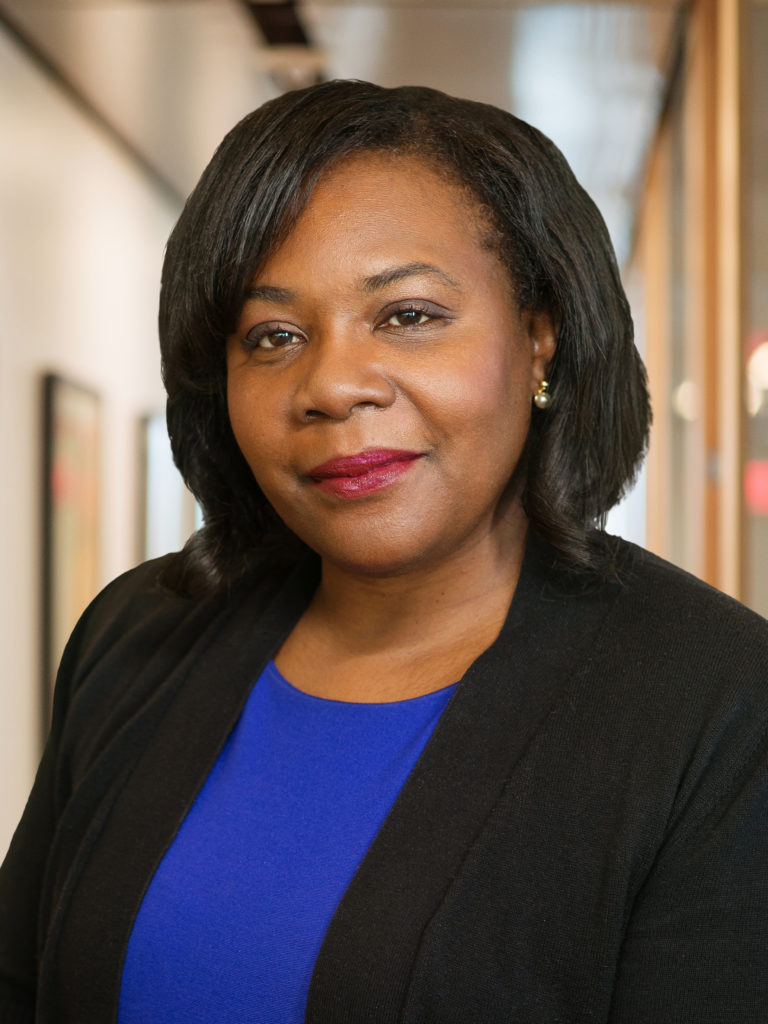
Wendy Lewis Jackson, Managing Director, Detroit, The Kresge Foundation
Wendy co-leads The Kresge Foundation’s efforts to revitalize Detroit and to strengthen its social and economic fabric. Her work supports organizations providing economic opportunity for low-income people and addresses the needs of vulnerable children and families.
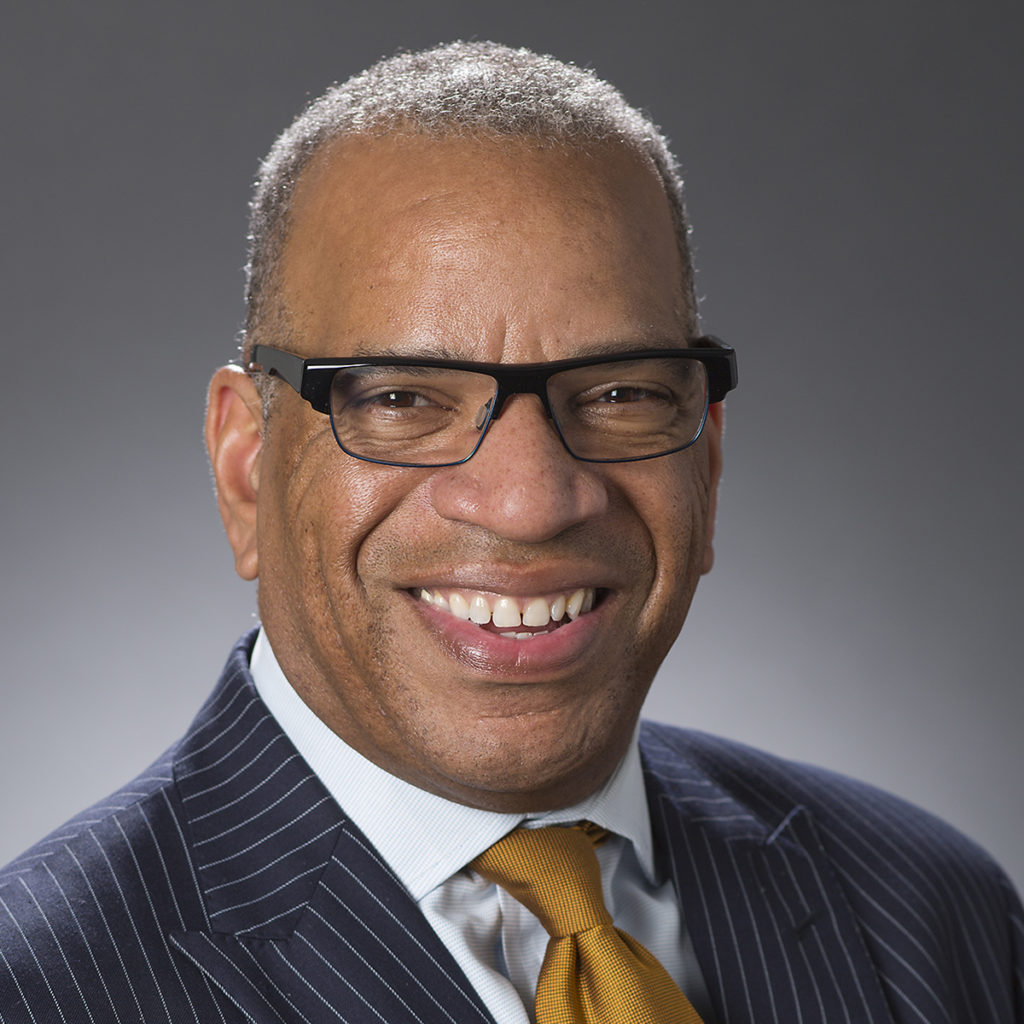
Scot Spencer, Associate Director, Advocacy and Influence, The Annie E. Casey Foundation
Scot leads The Annie E. Casey Foundation’s work in advancing community-focused policies, practices and strategies that increase opportunities for children, families and the places where they live and foster their success. Spencer also coordinates Casey’s local advocacy efforts in Baltimore.

About the feature image:
Photos at the top of this post are from Turning the Corner: Monitoring Neighborhood Change to Prevent Displacement, a three-year project guided by the Urban Institute and the Federal Reserve-Philanthropy Initiative, a collaboration between TFN’s OIC working group and the Federal Reserve. The initiative will continue as part of TFN’s Inclusive Economies group.
California’s Hottest Topic: The Housing Crisis and our Collective Response
By TFN Staff
On June 6, funders from across the state of California engaged in a conversation with a journalist, a nonprofit developer and an advocate attorney on Smart Growth California’s webinar, California’s Hottest Topic: The Housing Crisis and our Collective Response. The provided a timely breakdown of the most recent round of bills in the state capitol, and the opportunities and challenges that lie ahead.
Smart Growth California, an initiative of the Funders' Network, recently posted a recap of this compelling webinar sharing insight from panelists Liam Dillon of the Los Angeles Times, Doug Shoemaker of Mercy Housing,
and Anya Lawler of Western Center on Law and Poverty
Read the full post by Smart Growth California's Kerry Hastings here. For an audio recording of the webinar, reach out to Smart Growth California Director Ron Milam.
#TFNSanDiego
Speaking of California: TFN's 2020 Annual Conference: Bridge the Divide will take place in San Diego March 16-18. We're currently accepting proposals for conference sessions, speakers and mobile workshops,
particularly those that advance TFN’s interdisciplinary approach to equity, economy and environment. Learn more here.
Partners for Places: New grants available!
By: TFN Staff
The Funders' Network (TFN), in partnership with the Urban Sustainability Directors Network, is pleased to announce the opening of Round 15 of the Partners for Places grant program.
Partners for Places is a successful matching grant program that improves U.S. and Canadian communities by building partnerships between local government sustainability leaders and place-based foundations. National funders invest in local projects developed through these partnerships to promote a healthy environment, a strong economy and well-being for all residents. Through these investments, Partners for Places fosters long-term relationships that make our communities more prosperous, livable and vibrant.
In addition to the general grant program, Round 15 also includes dedicated funding to support green stormwater infrastructure projects that advance water-related sustainability goals.
TFN and USDN are excited to partner with Green Infrastructure Leadership Exchange, a practitioner network that supports communities seeking to grow green stormwater infrastructure programs, to support outreach efforts and participate in reviewing stormwater infrastructure project proposals.
The grant program provides partnership investments between $25,000 and $75,000 for one year projects, or between $50,000 and $100,000 for two year projects, with a 1:1 match required by one or more local foundations.
To date, Partners for Places has awarded nearly $7 million across North America in this successful matching grant program, leading to more than $14 million in investments.
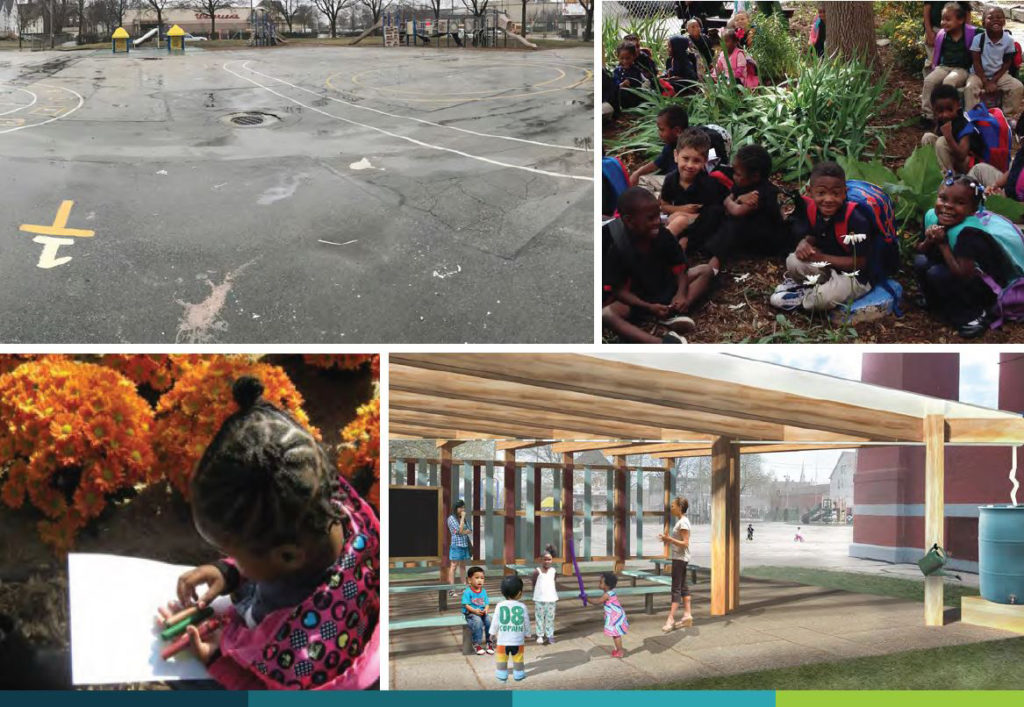
Creating a Successful Proposal
Partners for Places accepts proposals for the creation of a community-focused sustainability, climate action, adaptation/resilience, or comprehensive plan that specifically addresses sustainability. If your proposal requests funding for the creation of one of these plans, please closely review our Proposal and Award Guidance document before preparing your proposal.
In addition, all proposals are scored on the extent to which projects include meaningful involvement of priority audiences/stakeholders in program development and implementation.
The application deadline for Round 15 is July 30, 2019 (by 11:59 p.m., any time zone).
Please visit the Partners for Places webpage for more information. Here you can view our promotional video, download the Request for Proposals (RFP), and access our Proposal Form and Budget Form. You may also consult our Proposal and Award Guidance document to learn more about frerquently asked questions.
Info Webinar
TFN and USDN will host a Partners for Places Round 15 Info Webinar at 2 p.m. ET June 6. Please visit here to register.
Meet the Latest Grantees!
We announced the recipients of Partners for Places Round 14 matching grants in May. Learn more about the sustainability projects in these five cities.
Funder Investors
Partners for Places is supported by The JPB Foundation, Kendeda Fund, The Kresge Foundation, New York Community Trust, Pisces Foundation, The Summit Foundation, and Surdna Foundation.
Selection Process
A selection committee comprised of foundation representatives and urban sustainability directors will make grant selection decisions on behalf of Partners for Places, and awards will be announced on Nov. 6, 2019.
If the RFP or related documents don’t answer all your questions, please contact Ashley Quintana at ashley@www.fundersnetwork.org for more information.
Can evaluations promote equity? Join our next Power Forward webinar to learn more
By: TFN Staff
Funders and philanthropic institutions increasingly embrace equity as core to their work. Yet even among those organizations, evaluation is difficult to examine, revamp and cultivate through an equity lens. Join us for the latest installment of our Power Forward webinar series, Power for Just Practice: How Evaluations Can Promote Equity, 2 p.m. ET Jun 12.
This webinar will examine how funders are deploying new thinking and assets that articulate the value proposition and service paradigm of equity. While not all evaluation approaches are likely to support the shift of power imbalances and reduce inequities, the panel will focus on the principles of Equitable Evaluation and funder practices that support better data, organizational alignments and programs. Discussion will focus on tools and case studies currently being deployed that enhance thoughtful application of philanthropic equity commitments.
Power for Just Practices: How Evaluations Can Promote Equity
June 12 at 2 p.m. ET
Register here
Speakers:
Shamar Bibbins, Senior Program Officer, The Kresge Foundation
Steven LaFrance, Founder and CEO, Learning for Action
Kim Leonard, Senior Research Officer, The Oregon Community Foundation
Moderator
Anna Cruz, Senior Learning and Evaluation Officer, The Kresge Foundation
Please register for this funder-only webinar by June 7 to receive log-in details.
About TFN’s Power Forward series
As part of TFN’s 20th Anniversary in 2019, we’re hosting a series of deep-dive webinars that examine how philanthropy can leverage its collective power across a range of critical issues: policy work, sustainability efforts, economic prosperity, and supporting equity and inclusion in grantmaking. This month we kick Power for Just Practice installment of the Power Forward series, which will feature three webinars focused on embedding an equity lens into organizational practices.
Catch up on the series!
Have you missed a Power Forward webinar? Audio recordings of our webinars are available for download:
February 13: Power for Policy: Restoring Inclusive Democracy
March 13: Power for Policy: Shared Prosperity & Inclusive Economies
April 10: Power for Policy: Media, Messaging & the News
April 23: Power for Policy: Mobility & Access AdvocacyMay 15:Power for Just Practices: Let's Talk Race, Privilege & Philanthropy
Five Cities, Five Sustainability Solutions: Meet our newest Partners for Places Grantees
By Ann Fowler Wallace, TFN Director of Programs
Five cities across the United States will receive more than $920,000 dollars for sustainability efforts that focus largely on empowering and engaging low-income neighborhoods — supporting community-based approaches that address climate impacts, strengthen local economies and improve the well-being of all residents.
The Funders' Network (TFN), along with our partners at the Urban Sustainability Directors Network, is excited to announce the latest grantees of the Partners for Places matching grant program.
These sustainability efforts span both coasts, take place in cities both large and small, and build partnerships between government sustainability offices and place-based foundations.
Milwaukee, Wis., will transform playgrounds at two public schools in economically disadvantaged neighborhoods, trading slabs of concrete and chain link fences for vibrant, nature-inspired landscapes with green infrastructure features. The project includes adding environmental education components like outdoor classrooms, learning stations, and planter beds, while also providing funding for a new sustainability project specialist for the public school system.
In Evanston, Ill., Partners for Places funding will help the city remove barriers that prevent homeowners and tenants from accessing affordable housing that is energy efficient and climate resilient. The city, which hopes to move toward a net-zero affordable housing standard, will also create an advisory committee made up of local residents, developers, contractors, and architects with sustainability expertise to guide project implementation.
San Diego, Calif., which has adopted an ambitious climate action plan that calls for a 50 percent reduction of greenhouse emissions by 2035, will support efforts to empower leadership on climate solutions in low-income communities disproportionately affected by poverty, unemployment and environmental injustice. Partners for Places funding will also help support San Diego’s climate and equity specialist, one of the first municipal roles of its kind among cities nationwide.

Residents of Newark, N.J., will be able to take advantage of a job training and placement program that connects them to opportunities constructing, inspecting and maintaining green stormwater infrastructure projects, part of a larger city-wide effort to help people find full-time positions and family-sustaining salaries, while also addressing flooding threats in the city’s low income neighborhoods.
In Cleveland, Ohio, Partners for Places will help advance one of the cornerstones of the city’s climate action goals: creating a community-wide transition plan to 100 percent clean and renewable electricity by 2050 that prioritizes resiliency, energy security, and green jobs for Clevelanders most in need.
“Transitioning to clean energy is especially important for a city like Cleveland, where half our children live in poverty and where low-income communities and communities of color spend a disproportionate amount of their income on energy-related costs,” said John Mitterholzer, senior program officer for the environment at The George Gund Foundation. “We believe that cities can become leaders in clean energy by advancing social and racial equity, creating jobs, and making our communities more resilient in the face of climate change.”
The funding is made possible through the Partners for Places matching grants program, which has helped foster dozens of new partnerships between local government sustainability leaders and place-based funders across the U.S. and Canada over the past eight years. The matching grant program brings national funder investors together with place-based funders to support local sustainability and climate action projects.
“These projects harness the power of partnership and collaboration,” said Diane Ives, fund advisor for The Kendeda Fund’s People, Place and Planet program. “It’s heartening to see so much innovation and passion as people across government, philanthropy and other sectors work together to make their communities more sustainable, resilient and equitable.”
Partners for Places, led by the Funders’ Network for Smart Growth and Livable Communities in partnership with the Urban Sustainability Directors Network, will provide $433,790 in funding to these five cities through the grant program. With contributions from local matching funders, a total of $921,540 will be committed to fund sustainability projects in these selected cities.
The program is supported by seven investor foundations: The JPB Foundation, The Kendeda Fund, The Kresge Foundation, The New York Community Trust, Pisces Foundation, The Summit Foundation, and Surdna Foundation. This grant cycle includes $185,000 awarded to two green stormwater infrastructure projects — in the cities of Milwaukee and Newark — designed to advance water-related sustainability goals.
To date, Partners for Places has awarded nearly $7 million across North America in this successful matching grant program, leading to nearly $14 million in investments.
Partners for Places will open a new round of funding for the general grant program on June 3, 2019. The Round 15 RFP will be due July 30, 2019.
The latest Partners for Places grant recipients and their matching funders are:
• Cleveland, Ohio ($50,000): To create a community-wide transition plan to 100 percent clean and renewable electricity that prioritizes resiliency, energy security, and green jobs for Clevelanders most in need. Matching funders: The Cleveland Foundation ($25,000); The George Gund Foundation ($25,000); United Black Fund of Greater Cleveland ($4,000).
• Evanston, Ill. ($125,000): To identify and ultimately remove barriers to achieving affordable, resilient net-zero homes. Matching funders: The Chicago Community Trust ($100,000); Evanston Community Foundation ($25,000).
• Milwaukee, Wis. (75,000): To promote equity and sustainability in Milwaukee Public Schools with natural schoolyards and outdoor classrooms, green infrastructure, and a new sustainability project specialist. Matching funder: Fund for Lake Michigan ($123,750).
• Newark, N.J. ($110,000): To establish a training and jobs placement program for residents to access green stormwater infrastructure construction, inspection, and maintenance opportunities. Matching funders: CareerWorks: Greater Newark Workforce Funders Collaborative ($85,000); Victoria Foundation ($25,000).
• San Diego, Calif. ($73,790): To build community voice and action among communities in Southeast San Diego in implementation of the City of San Diego's Climate Action Plan. Matching funder: The San Diego Foundation ($75,000).

About Partners for Places Partners for Places
A joint project of the Funders’ Network for Smart Growth and Livable Communities and the Urban Sustainability Directors Network, Partners for Places is a successful matching grant program that improves U.S. and Canadian communities by building partnerships between local government sustainability leaders and place-based foundations. National funders invest in local projects developed through these partnerships to promote a healthy environment, a strong economy and well-being for all residents. Through these investments, Partners for Places fosters long-term relationships that make our communities more prosperous, livable and vibrant. For more information on Partners for Places, visit www.fundersnetwork.org/partners-for-places.
About the Funders’ Network for Smart Growth and Livable Communities
The Funders’ Network for Smart Growth and Livable Communities (TFN) is a mission-driven network of grantmakers across North America, working to inspire, strengthen and expand funding and philanthropic leadership that yield environmentally sustainable, socially equitable, and economically prosperous regions and communities.
About The Urban Sustainability Directors Network
The Urban Sustainability Directors Network (USDN) is a peer-to-peer network of local government professionals from cities across the United States and Canada dedicated to creating a healthier environment, economic prosperity, and increased social equity. Our dynamic network enables sustainability directors and staff to share best practices and accelerate the application of good ideas across North America.
For additional information and media inquiries, contact: Tere Figueras Negrete, Communications Director at the Funders’ Network for Smart Growth and Livable Communities, tere@www.fundersnetwork.org
Join us as we talk race, privilege and philanthropy
By: TFN Staff
How do we decentralize whiteness and address systemic racism and oppression in philanthropy? What are the embedded biases and inequitable systems that impact our work and relationships in the communities we serve? And are organizational practices advancing — or impeding — racial equity and justice work in our own institutions?
While many foundations consider equity core to their philanthropic mission, we know that advocating for equitable and just practices can prove to be a fraught process.
Join us for the next installment of TFN’s Power Forward webinar series for a frank conversation about the sector’s willingness to address structural racism and its impact on organizational practice. Power for Just Practices: Race, Privilege and Philanthropy, which takes place at 2 p.m. ET May 15, brings together a panel of national experts and funder leaders for an introspective dialogue about sharing power, rethinking internal practices and building equitable community strategies.
Speakers:
Sara Eagle Heart, CEO, Native Americans in Philanthropy
Lori Villarosa, Founder and Executive Director, Philanthropic Initiative for Racial Equity
Moderator:
Carly Hare, National Director, Change Philanthropy
About TFN’s Power Forward series
As part of TFN’s 20th Anniversary in 2019, we’re hosting a series of deep-dive webinars that examine how philanthropy can leverage its collective power across a range of critical issues: policy work, sustainability efforts, economic prosperity, and supporting equity and inclusion in grantmaking. This month we kick Power for Just Practice installment of the Power Forward series, which will feature three webinars focused on embedding an equity lens into organizational practices.
Catch up on the series!
Have you missed a Power Forward webinar? Audio recordings of our webinars are available for download:
February 13: Power for Policy: Restoring Inclusive Democracy
March 13: Power for Policy: Shared Prosperity & Inclusive Economies
April 10: Power for Policy: Media, Messaging & the News
April 23: Power for Policy: Mobility & Access Advocacy
Learn more about Turning the Corner: Monitoring Neighborhood Change to Prevent Displacement
By Alicia Kitsuse, Director, TFN's Older Industrial Cities Program
The Turning the Corner project was incubated by the Federal Reserve-Philanthropy Initiative, a collaborative research partnership between TFN's Older Industrial Cities working group and regional Federal Reserve Banks.
Two new reports from the Urban Institute share lessons on neighborhood displacement risk in five cities with recovering or moderately strong housing markets. The study reports on research gleaned fromTurning the Corner: Monitoring Neighborhood Change to Prevent Displacement, which piloted a research model to monitor neighborhood change, drive informed government action, and support displacement prevention and inclusive revitalization in five cities: Buffalo, Detroit, Milwaukee, Phoenix, and the Twin Cities. Findings from the research,
which took place in 14 neighborhoods experiencing change in their residential or local business environment, highlights the diverse baseline conditions where displacement risk occurs and illustrates the various trajectories displacement risk may take.
One of the key takeaways from the report: Residents’ perceptions of change provide key qualitative data that’s essential for informed, pro-active response to prevent displacement and support inclusive neighborhood revitalization.
The Funders’ Network is proud to have contributed to efforts that resulted in the publications Turning the Corner: Lessons from Five Cities on Displacement Risk in Changing Neighborhoods, and Turning the Corner: Implications of Neighborhood Revitalization for Public Safety, Small Businesses, and Capital Investments, including staffing the TFN Federal Reserve-Philanthropy Initiative (FPI), which helped guide the project. The FPI is a collaborative research partnership between TFN and regional Federal Reserve Banks that focuses on community and economic development issues.
The reports’ authors will share findings and recommendations from the study in a webinar on May 2nd. (You can find more information and a link to register here.) The report will also be featured at the 2019 annual meeting of TFN's Older Industrial Cities working group in Cleveland. (Stay tuned for more details!)
The Turning the Corner Project piloted a research model to monitor neighborhood change, drive informed government action, and support displacement prevention and inclusive revitalization. The project studied the effects of new investment in neighborhoods made up of longer-term residents with low and moderate income, most of whom are people of color.
Site-based teams composed of a research partner, a local funder, and a cross-sector advisory group of local stakeholders used quantitative and qualitative data to explore residential, commercial, and cultural displacement.
Researchers found that residents often see change happening before it shows up in quantitative data, and that engaging people who live or work in affected neighborhoods can help to interpret trends. For example, residents in Detroit saw investment in infrastructure such as lighting and street resurfacing as early indicators of market transition, data that is not captured in conventional measures of neighborhood change.
Interviews with neighborhood stakeholders also revealed that associations between neighborhood revitalization and presumed improvements in neighborhood well-being, such as reduction in crime, did not necessarily translate into greater feelings of safety among residents. Researchers found that some community members reported feeling less safe after new investment in their neighborhood, due to increased police presence in the area and lack of connection with new neighbors. These findings varied by race, and appeared to indicate concern about racially biased policing practices, suggesting a need for a nuanced understanding of residents’ lived experience in the crafting of neighborhood revitalization plans and related policies.

The study also found that small local businesses are at greater risk of displacement due to neighborhood change, as rising rents, regulatory changes, and loss of clientele destabilize the business environment. Researchers note that funders can provide meaningful assistance to businesses through intentional and targeted business supports. In the Twin Cities, for example, a funder collaborative offered businesses affected by light rail expansion technical assistance and loans to cover revenue losses.
Key recommendations from the cross-site inquiry include:
- Inclusion of residents by civic actors and local governments in decision-making about their neighborhood’s future direction. Formal structures for shared influence in guiding the future of neighborhoods can help ensure residents benefit from new investment, as can collective land ownership models such as cooperative housing and community land trusts.
- Coordination between the civic sector and local government to prevent displacement. Cross-sector coalitions can quickly engage when new opportunities for influencing development arise, and can help shift the narrative to encourage proactive efforts to pre-empt displacement in weaker markets.
- Regular, monitoring of neighborhood change by a trusted data intermediary. Up-to-date information on where change is occurring can help communities identify strategic opportunities for interventions to prevent displacement and can suggest what types of neighborhood investment might be most useful.
In addition to the two reports, the Urban Institute published three resources for communities to monitor change:
In addition to the two reports, the Urban Institute published three resources for communities to monitor change:
Guide to Measuring Neighborhood Change to Understand and Prevent Displacement: A guide on data sources and methods for monitoring neighborhood change, drawn from the experiences of the Turning the Corner local research and from NNIP.
Turning the Corner Qualitative Toolkit on Neighborhood Change: Protocols and related materials for conducting resident focus groups and business manager interviews about perceptions of neighborhood conditions and trends.
Turning the Corner Literature Catalog: A listing of recent literature and projects on neighborhood change and displacement, categorized by topic and method.
Funder Support
TFN staffed the Turning the Corner project’s Steering Committee and served as a communications liaison with the local funders who supported the study:
Community Foundation for Greater Buffalo
Community Foundation for Southeast Michigan
John S. and James L. Knight Foundation
Northwestern Mutual Foundation
Ralph C. Wilson, Jr. Foundation
Support for the Urban Institute’s participation in the study was provided by The Kresge Foundation.
Connect with TFN
We’re eager to hear your thoughts, questions and concerns about the role funders can play in supporting displacement prevention and inclusive revitalization in changing neighborhood markets and look forward to hosting discussion of the study in Cleveland during our annual Older Industrial Cities working group meeting. If you'd like more information about the Older Industrial Cities working group, the
Federal Reserve-Philanthropy Initiative (FPI), or other TFN efforts to support inclusive economies, please feel free to reach out to me directly at alicia@www.fundersnetwork.org
About the Author
Alicia Kitsuse, Director, TFN’s Older Industrial Cities

As Director of TFN’s Older Industrial Cities program, Alicia connects funders engaged in the challenging work of revitalizing post-industrial cities to learning opportunities, key resources, and most importantly to one another. She is also the lead contact for TFN’s Anchor Institutions Funders’ Group.
Prior to joining the Network’s staff in January 2017, Alicia served as a Program Officer at the Charles Stewart Mott Foundation in Flint, Michigan. As a member of Mott’s Flint grantmaking team, she worked on a variety land use, community and economic development, and workforce-related projects focused stimulating growth and revitalization in the City of Flint and the surrounding region. Alicia also provided technical assistance to the City of Flint on its award-winning Imagine Flint master plan, and served on a variety of local and national advisory boards.
As a funder member of TFN while at Mott, Alicia played a variety of leadership roles within the OIC program, including as a member of OIC Steering Committee, and as Co-Chair of the OIC’s Federal Reserve/Philanthropy Initiative.
Cleveland Fed to host Policy Summit 2019: Connecting People & Places to Opportunity
By Alicia Kitsuse, Director, TFN's Older Industrial Cities Program
Register now for Policy Summit 2019: Connecting People & Places to Opportunity, hosted by the Federal Reserve Bank of Cleveland in partnership with the Federal Reserve Banks of Philadelphia, St. Louis, Minneapolis, and Chicago.
The Funders' Network is among several organizations that have also partnered with the Cleveland Fed for the upcoming Policy Summit 2019, which will take place June 19-21 in Cincinnati, Ohio.
Policy Summit is the Cleveland Fed’s premier regional conference that explores solutions, at both the practitioner level and the policy level, to challenges that low- and moderate-income communities face. This biennial, multi-day event offers attendees the latest research and best practices through presentations by and outside-the-Beltway conversations with leading researchers, academics, practitioners, and policymakers.
Policy Summit 2019 explores the theme of economic mobility and resilience within and across urban, suburban, and rural communities in the United States. The event’s sessions will address questions such as the following: How are an individual’s prospects for getting ahead changing given growing regional disparities, persistent poverty, and racial segregation? Are place-based or people-based policies more effective, and in what contexts? What can policymakers and practitioners do to improve the likelihood that people, businesses, and communities are set up for long-term success in today’s marketplace?
Policy Summit 2019 will open with keynote speakers Dr. Raj Chetty and Dr. David Williams of Opportunity Insights, a research and policy institute dedicated to understanding why upward mobility and economic progress have stalled for so many U.S. families. The event will close with a keynote by Dr. Loretta J. Mester, president and CEO of the Cleveland Fed.
The conference will be held Wednesday, June 19, through Friday, June 21, at the Hilton Cincinnati Netherland Plaza.
Check out the full agenda here.
Next up in our Power Forward series: Mobility & Access Advocacy
By: TFN Staff
Funders focused on mobility and access know that investing in people power is one of the most effective ways to influence policy and practice, redirect funding and carve out street space for sustainable modes of transportation.
Join us for the latest in our Power Forward webinar series, Power for Policy: Mobility and Access Advocacy, at 3 p.m. ET April 23.
Four funders will share the strategies, successes and the proverbial bumps in the road encountered as they help non-profits develop sustainable funding models, accelerate progress and maintain enthusiasm in a landscape that needs long-term commitment. You’ll hear firsthand stories stories, learn some practical tips and gain clarity on philanthropy’s role in this complex work. The webinar includes time for Q & A, so please feel free to submit questions in advance when you register.
Power for Policy: Mobility and Access Advocacy
April 23 at 3 p.m. ET
Register here
Speakers:
David Bragdon, Executive Director, TransitCenter
Elizabeth Love, Senior Program Officer, Houston Endowment
John Mitterholzer, Senior Program Officer for the Environment, George Fund Foundation
Neelima Shah, Program Officer, Bullitt Foundation
Moderator
Martha Roskowski, TFN Program Consultant
Please register for this funder-only webinar by April 19 to receive log-in details.
Catch up on the series!
Have you missed a Power Forward webinar? Audio recordings of our webinars are available for download:
February 13: Power for Policy: Restoring Inclusive Democracy
March 13: Power for Policy: Shared Prosperity & Inclusive Economies
April 10: Power for Policy: Media, Messaging & the News
About TFN’s Power Forward series
As part of TFN’s 20th Anniversary in 2019, we’re hosting a series of deep-dive webinars that examine how philanthropy can leverage its collective power across a range of critical issues: policy work, sustainability efforts, economic prosperity, and supporting equity and inclusion in grantmaking. This month we wrap up the Power for Policy installment of the Power Forward series. Stay tuned for future Power Forward installments focused on climate, prosperity and equitable practice.





